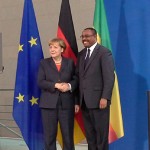
German Chancellor Angela Merkel on Wednesday welcomed HaileMariam Dessalegn, the Ethiopian Prime Minister with military honours at the forecourt of the Federal Chacellory in Berlin.
Prime Minister HaileMariam was in Germany to discuss ways of further deepening the bilateral cooperation between the two countries.
The Premier and his delegation held discussions with high level officials of the German government on ways of boosting ties particularly technical and financial cooperation.
Germany is among the leading development partners of Ethiopia with 102 million Euros assistance between 2012 and 2014.
The government of Germany has decided to raise the development assistance it gives to Ethiopia to 129 million Euros in 2015.
Addressing a joint press conference after bilateral discussions with the Chancellor, Prime Minister HaileMariam thanked Germany for assisting Ethiopia in capacity building,, education, agriculture and the technological sector.
The Ethiopian leader said Germany was also working with countries in the Horn of Africa in conflict resolution particularly with regards to the situation in Somalia.
Somalia, he says “is becoming stabilized but there are a lot of things we have to do to bring true normalcy in Somalia which we are working towards Vision 2016 for Somalia to become a strong nation.
On German investment in Ethiopia, Prime Minister HaileMariam said “I came here today to invite more German companies to come and invest in my Country. Ethiopia is a very stable country and conducive environment is there for Investors.
“As you know Germany is working excellently on renewable energy resources, Ethiopia is also involved in huge renewable energy sources – hydro, wind, etc., we want German technology to be applied in my country in developing this huge renewable potential in my country.”
The two leaders also discussed the Ebola crisin in West Africa. Prime Minister Haile Mariam described the disease as one of the main threats in Africa and called on Germany to assist the continent to upgrade ist health Systems in the fight against Ebola.
Answering questions from journalists, the Ethiopian leader said industrialization and agricultural development in Ethiopia “has to be driven by the private sector.
“For Investors to come to Ethiopia, the government has the responsibility to create a conducive Environment.”
He called on Germany to engage more aggressively in Africa. “We feel that the German enggement in Africa has to be improved. We feel that Germany has to move very aggressively in Africa, because Africa has become the next frontline of Investment and this is a suitable Moment for Germany to come.
“The situation is Africa as a whole is improving but still we have spots of areas where we have to work very hard in order to pacify the continent, especially in the Horn of Africa, I think we need to work very hard together with the international community.”
Chancellor Merkel assured the Prime Minister of Germany’s continued support to accelerate the development of Ethiopia.
Economic Relations
Recent years have seen steady growth in the volume of bilateral trade. According to Federal Statistical Office figures, in 2012 German imported from Ethiopia goods worth EUR 207.5 million (2011: EUR 247.4 million) and exported to there goods worth EUR 168.7 million (2011: EUR 122.5 million).
In the past few years, Germany has been one of the biggest buyers of Ethiopian goods. Ethiopia’s main export to Germany is coffee, and Germany has traditionally been the largest buyer here, taking more than 30 per cent of the country’s total coffee exports. The main German exports to Ethiopia are finished products such as machinery, engines, motor vehicles, chemicals and medicines. German companies have recently begun to invest in Ethiopia, especially in the flower-growing and the leather-processing industries.
Development cooperation
Ethiopia is a partner country of German development cooperation. Germany is helping Ethiopia to implement its national development strategy, the Growth and Transformation Plan, and to pursue its Millennium Development Goals (MDGs). Since bilateral development cooperation began 50 years ago, Ethiopia has received a total of more than EUR 1 billion under Technical and Financial Cooperation.In coordination with the Ethiopian government and international development partners, German development cooperation focuses on two priority areas:
- education (vocational training and higher education)
- sustainable land management
For the new priority area education, which was agreed upon in 2011, EUR 38 million is being made available up to 2014.
Cooperation on sustainable land management (as part of the Ethiopian government’s Sustainable Land Management Programme) is being continued and stepped up, Germany having pledged EUR 21 million for the period 2011 to 2014 as well as a special commitment of EUR 7.5 million in 2012. As part of another special commitment worth EUR 10 million (2012), a project on adapting to climate change and improving drought resilience in the lowland areas of Ethiopia is also being supported. This priority area of development cooperation also includes projects on agricultural policy (seed development, training and agricultural dialogue).
Besides these priority areas, cooperation focuses on the creation of a national quality infrastructure, including a national standards agency, as well as on the country’s Urban Governance and Decentralisation Programme.
At the most recent intergovernmental negotiations in 2011, Germany made new commitments worth a total of EUR 102 million under government development cooperation with Ethiopia up to 2014. Following the 2011 drought, Germany pledged and provided a further EUR 64.27 million for food security measures through partners such as the World Food Programme and German Agro Action.
Besides the Federal Ministry for Economic Cooperation and Development (BMZ), the Federal Ministry of Food, Agriculture and Consumer Protection (BMELV) and the Federal Environment Ministry (BMU) are also involved in development cooperation with Ethiopia.
Mellisa Sheridan, ANA Diplomatic Editor
